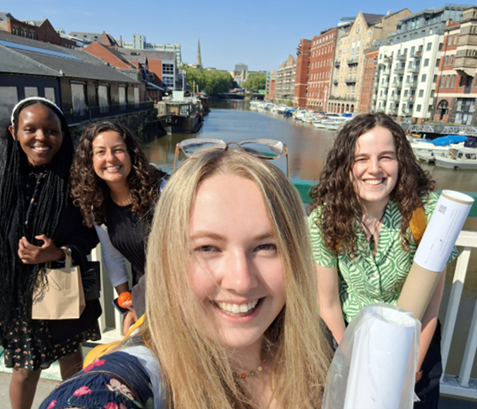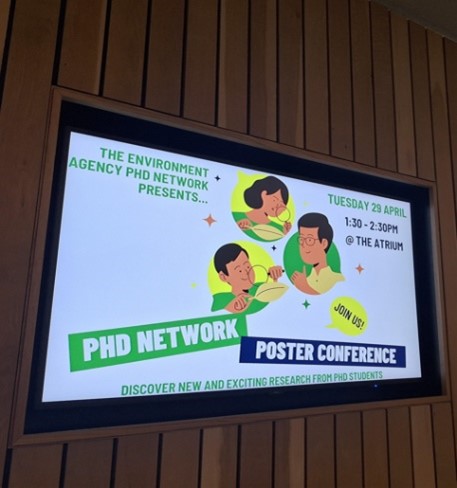Waiting with anticipation and an air of excitement, my finger lingered over the ‘join meeting’ icon on Microsoft Teams. I was about to become very familiar with online meetings over the next few months. Joined by the friendly faces of my fellow Environment Agency funded colleagues, we filled the call with cheery chatter as we awaited the briefing for our online placements. Our eyes widened as we were given the seemingly impossible task, ‘what are the industry challenges and how do they relate to my PhD?’. Daunted by the prospect of such a colossal question, we jumped into action and devised a plan.
Joined by the friendly faces of my fellow Environment Agency funded colleagues, we filled the call with cheery chatter as we awaited the briefing for our online placements. Our eyes widened as we were given the seemingly impossible task, ‘what are the industry challenges and how do they relate to my PhD?’. Daunted by the prospect of such a colossal question, we jumped into action and devised a plan.
After a copious volume of coffee and a scrambled teams call later, our method was complete! We would investigate the challenges through a series of informal interviews, and like many stand out detectives before us (exclusively Scooby Doo) we decided that the best course of action was to split up and look for clues after three initial sessions. It was here that I embarked on the journey of my Environment Agency online placement.
My first port of call was to navigate through the winding maze of policy challenges surrounding my research in upland natural flood management. Early-stage conversations with Natural Resources Wales, The Environment Agency and DEFRA gave direction to the highly reactive policy surrounding natural flood management (NFM) implementations, which is credited to the considerable evidence gaps regarding their effectiveness and (often controversial!) trade-offs between flood mitigation and disruption to the natural environment. This slots neatly into the evidence-based policy category within DEFRA, delivered through scientific research, the other category being ministerial policy, which involves a much shorter research process.
The second avenue to explore was uncovering the practical day to day challenges surrounding research in natural flood management. Delving into discussions with DEFRA and Natural England, I cringed at the sudden realisation of an emerging theme… the research gap is extremely large! This, along with the many challenges surrounding stakeholder engagement, are the primary limiting factors for determining locations and installing NFM solutions. I spent much of these meetings being completely blown away by the complexity of the functioning of organisations as vast as DEFRA and the Environment Agency and as such, it can be challenging to locate specific personal in relevant teams, which further increases barriers to NFM implementations! Once barriers had been established, I then pondered the question of how such challenges differed between nations. The standout difference was that Natural Resources Wales are a considerably smaller organisation than the Environment Agency and with that, have difficulties upscaling NFM into a catchment level. I discovered that typically in Wales, nature-based solutions are implemented on land that is already owned by Natural Resources Wales, whereas the Environment Agency have a much wider scope.
Finally, building on the solid foundations of knowledge passed down through previous meetings, I set out to satisfy my final objective, ‘what are the research needs from outside of academia?’. A complex question within own right, but through the next few meetings I understood it perfectly. FLOOD-CDT itself sits within the FCERM R&D Programme, in which there is a significant lack of evidence towards practical approaches. Organisations are keen on using research to drive practical, real-world applications to solve current problems, which is exactly where our PhDs sit!

After three insightful months, the placement drew to a rewarding close with a visit to Horizon House, the Environment Agency’s head office, in Bristol, for the 2025 PhD Knowledge Share Event. The day kicked off with a captivating talk from the Environment Agency’s Chief Scientific Officer, Dr Robert Bradburne, who not only highlighted the importance of research within the organisation, but gave much welcomed insight into his own career journey… PhD student all the way to chief scientific officer is definitely something to aspire to!
It was here, that I had the great opportunity to present the aims, methodology and motivation for research in the form of my projects first ever research poster! It was a brilliant end to a thought provoking few months, but it was all the more rewarding to hear the other research occurring throughout the Environment Agency’s PhD Network.
The conversations I have had throughout my placement have been instrumental in shaping the motivation behind my research and I’m very thankful to the individuals from the Environment Agency, Natural Resources Wales, DEFRA and Natural England, who kindly gave me their time. As usual, I am very grateful to have the privilege of working alongside my endlessly inspiring Environment Agency funded colleagues, Lily, Helen and Rebeca, and am already looking forwards to our next event!
